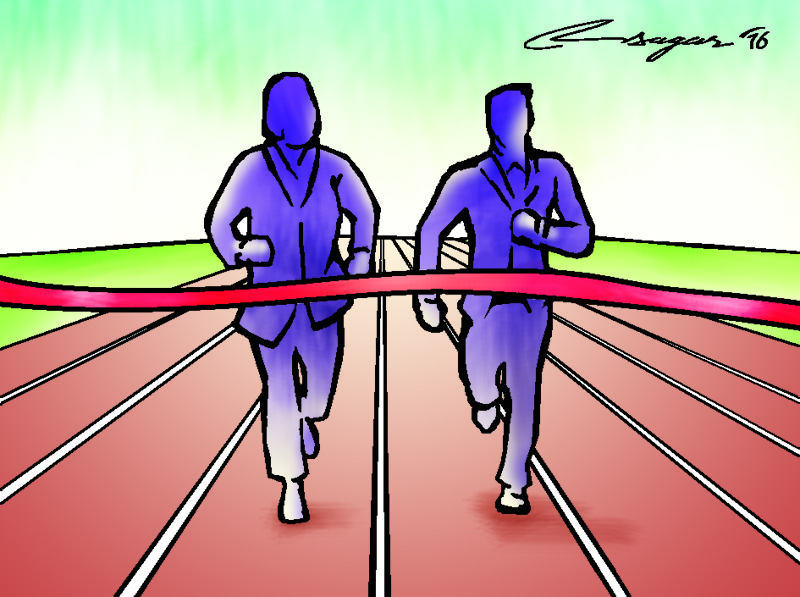Poll drama in the US: Who will win?
Even if there is a neck-to-neck win, like John Kennedy had in 1960, which cannot be ruled out considering the close contest in the Toss-up states, can Trump garner votes from all the battleground states and turn the blue ones into his favor?
Millions of eyes are now riveted on the world’s greatest electoral drama about to unfold: the four year race for US Presidency, but experts are finding it pretty hard, despite all the surveys taken so far, to say who will win the neck-to-neck race to the White House: Donald Trump or Hillary Clinton?
The contest between the two candidates could hardly have been more stark.
It is not just the difference of gender and demeanor, but more: their background and career, attitude and image, pledges and performance, virtually everything, except probably their color and citizenship that makes the spectacle fascinatingly curious and full of suspense and for more than one reason.
The first one among them is surely the string of epithets hurled on Trump, whether deserving or otherwise, perhaps the most vitriolic chorus of condemnations ever earned by a candidate in American presidential poll history.
The next in line with the bevy of issues Trump is bringing to boost his vote. Most, if not all, of them look conjured, out of reality, and out of the box.
Indeed, some of the charges sound biting and the campaign is becoming so grotesque that quite a few fellow Republicans have found it embarrassing, and often impossible to endorse him. George H. W. Bush, who has already signaled he is voting for Hillary, is not alone.
The contest, claims Richard N. Haas of some repute, has exposed deep fault lines within the American society, damaging the country’s global reputation and with his victory is likely to emerge a divided country with a divided government.
A third one is the use of secret information pulled out of the hat to destroy the rival’s image, a Hooverian trick to wound public figures, maybe for the right cause, but in all likelihood at the wrong moment and in a wrong way which Hames Comey may find hard to convince.
Some of the charges trumped up against Hillary look serious. Nobody claims she is a paragon of political virtues. Who is? But can America be made truly great which is what Trump promises – by playing petty politics?
The counts against his own past are far from excusable. The Times’s scoop on Trump’s $ 916 million declared tax loss in 1995 or the swirl of seventeen sexual assault charges are but two of them.
Comparatively, Factcheck.org ranks him three times ahead of his rival Clinton on falsity score implying Trump is far more unreliable than the lady is.
The salvos Trump fires, the posture he makes, and the pledges he offers are another reason rendering the drama interesting.
He is reported to have undocumented workers to build his Trup Tower, allegedly refused to rent apartments to Afro-Americans, and retweeted Neo-Nazis and advocates jail for Hillary.
Externalizing the blame can appeal for awhile and for a few voters, but much of his guile sounds less plausible, and more prurient, even puerile. Recall his tramping against the Islamic minority, Obamacare, NAFTA, NATO, climate change, his ire against the immigrant community (in a land build up by immigrants).
His 25-million job offer and another to build a wall against Mexico could end up like his Trump TV and Tower. He is anti-immigrant, what if two of his three wives have been immigrants.
All this notwithstanding, Trump has the intelligence to sense the incoming defeat and before mouthing the grapes, they are beginning to taste sour. If the media are rigging and the American election is really a ’a big lie’, why did he join that game, after all?
His “accept if I win, reject if I lose,” stand is sending ripples of mass apprehension. His gestures to save face could unleash some bouts of political instability, but not enough to unhinge American democracy.
Here are the counts that could go against Ms Clinton – Falling black turnout in early voting; the affection of elderly voters for Trump compared to a fear among the young; hard money likely to be used by the relatively rich Republicans.
Between 1937 and 1999, the share of US respondents who indicated they would vote for a qualified woman presidential aspirant rose from a mediocre 33% figure to a high 92%.
The turnout is likely to swoop upward at least among the female voter population. In the last six presidential elections democratic candidates have defeated Republicans in the popular vote.
During the last two decades, in every presidential election, the share of white voters has been declining by 2% in contrast to the vote of the colored group, Hispanics, and Amerasians which is on the rise and given that Trump exudes no charisma worth the name it will be very hard for him to garner 70% vote from the whites (Reagan in 1984 got just 64%).
Nor is Trump getting much support even from his senior co-Republican leaders as Hillary is from her democrats colleagues.
Thus, even if there is a neck-to-neck win, like John Kennedy had in 1960, which cannot be ruled out considering the close contest in the Toss-up states, can Trump garner votes from all the battleground states and turn the blue ones into his favor? Extremely unlikely on a bet of one to nine.
Which means Ms Hillary, in all likelihood, will make history. But if, indeed, the improbable happens and Trump wins, he would become, as someone has put it, the most entertaining president in American history.
The question is: Do the Americans need one?






